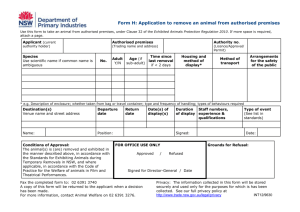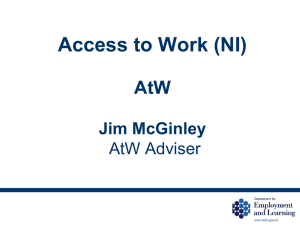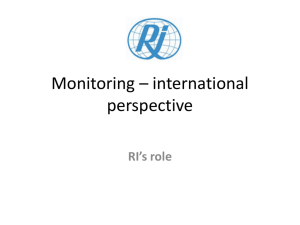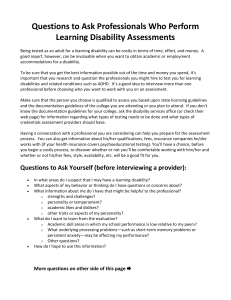Authorised Officers * Entry of Premises Policy
advertisement
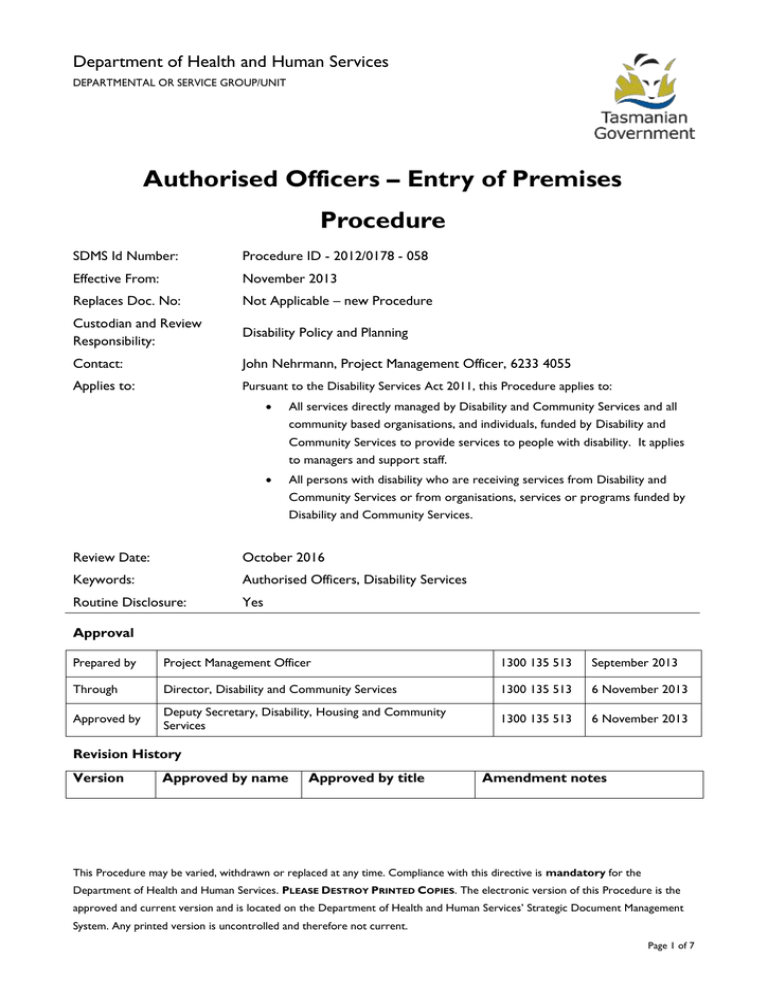
Department of Health and Human Services DEPARTMENTAL OR SERVICE GROUP/UNIT Authorised Officers – Entry of Premises Procedure SDMS Id Number: Procedure ID - 2012/0178 - 058 Effective From: November 2013 Replaces Doc. No: Not Applicable – new Procedure Custodian and Review Responsibility: Disability Policy and Planning Contact: John Nehrmann, Project Management Officer, 6233 4055 Applies to: Pursuant to the Disability Services Act 2011, this Procedure applies to: All services directly managed by Disability and Community Services and all community based organisations, and individuals, funded by Disability and Community Services to provide services to people with disability. It applies to managers and support staff. All persons with disability who are receiving services from Disability and Community Services or from organisations, services or programs funded by Disability and Community Services. Review Date: October 2016 Keywords: Authorised Officers, Disability Services Routine Disclosure: Yes Approval Prepared by Project Management Officer 1300 135 513 September 2013 Through Director, Disability and Community Services 1300 135 513 6 November 2013 Approved by Deputy Secretary, Disability, Housing and Community Services 1300 135 513 6 November 2013 Revision History Version Approved by name Approved by title Amendment notes This Procedure may be varied, withdrawn or replaced at any time. Compliance with this directive is mandatory for the Department of Health and Human Services. PLEASE DESTROY PRINTED COPIES. The electronic version of this Procedure is the approved and current version and is located on the Department of Health and Human Services’ Strategic Document Management System. Any printed version is uncontrolled and therefore not current. Page 1 of 7 Introduction The purpose of this procedure is to ensure that State Service employees or State Service officers authorised to enter funded service provider’s premises, or private funded premises under Part 4, Division 3 of the Disability Services Act 2011(the Act), perform their relevant duties and meet responsibilities in line with the requirements of the Act and Departmental policy and procedures. The procedure sets out the rights, processes and requirements to be followed by ‘authorised officers’ when entering funded premises. The procedure also assists service providers to meet their requirements under the Act in regard to authorised officers entering premises. Mandatory Requirements Sections 2, 3, 4 and 5 of the Procedure are ‘Mandatory Requirements’ under Part 4, Division 3 of the Act. Procedure 1 Endorsement of Area Managers – the relevant Area Manager must endorse, in writing, the entry of premises, removal of documents or relocation of persons with disability, prior to any Authorised Officer entering any premises. Area Managers must ensure that, within 24 hours of an Authorised Officer having entered premises, the Director, Disability and Community Services, is provided with relevant facts, data and client impact information. Area Managers must ensure that the endorsement of any entry to premises given to Authorised Officers is consistent with the Authorised Officer’s ‘protective’ function and is based on a specific complaint or specific suspected contravention of the Act. 2 Rights and responsibilities of Authorised Officers who enter premises – An authorised officer may enter premises specified in the authorisation only for the following purposes1: 1) To determine the extent to which the terms and conditions of a Funding Agreement are being complied with, or 2) To ensure that persons with disability who reside in, or receive specialist disability services in, the premises are receiving the care and support that is necessary or desirable for their health and wellbeing, or 3) To ensure the safety of persons with disability who reside at, or receive specialist disability services in, the premises. An authorised officer may enter funded provider’s premises at any time without prior warning to the owner of, or any occupier of, the premises2. 1 Disability Services Act 2011 s26 (2) 2 Disability Services Act 2011 s26(3) This Procedure may be varied, withdrawn or replaced at any time. Compliance with this directive is mandatory for the Department of Health and Human Services. PLEASE DESTROY PRINTED COPIES. The electronic version of this Procedure is the approved and current version and is located on the Department of Health and Human Services’ Strategic Document Management System. Any printed version is uncontrolled and therefore not current. Page 2 of 7 An authorised officer who enters funded provider’s premises must ensure that, if he or she enters a part of the premises designated for the private use of a person with disability, while the person is present in the part of the premises, the authorised officer immediately tells the person the purposes for which the authorised officer has entered the premises. An authorised officer who enters premises must, at the request of a person on the premises, show the person proof that the officer is authorised to enter the premises, or leave the premises as soon as practicable after the request is made. An authorised officer must wear the Authorised Officer Identification Card at all times when entering and staying on funded provider premises. The ID card will only be issued after the officer has completed the required training. An authorised officer is not authorised to use force to enter premises. However a police officer may be requested by the authorised officer to use force to enter premises3. A funded provider, any employee of a funded provider and any individual receiving a grant must not impede an authorised officer in performing their functions and duties under the Act, and this includes impeding access to premises. Failure to comply with these provisions of the Act may result in the grant to the funded provider or individual being terminated. 3 Requirements where private funded premises are entered4 – an authorised officer should make reasonable attempts to give at least 48 hours’ prior notice to a person who resides at the premises prior to entering private funded premises, unless the authorised officer is reasonably of the opinion that it is necessary to enter the premises without notice in order to ascertain – Whether a person with disability is receiving the care and support that is necessary or desirable for the person’s health and wellbeing, or Whether a person with disability is safe. An authorised officer may only enter private funded premises before 7 a.m., or after 7 p.m., if it is reasonably necessary to do so in order to ascertain whether – The person with disability is receiving, at the premises, or from a person who resides at the premises, the care and support that is necessary or desirable for the health and wellbeing of the person; or A person with disability is safe. An authorised officer who enters private funded premises must as soon as practicable tell a person on the premises, and any person with disability on the premises, the purpose for which the authorised officer has entered the premises5. 3 Disability Services Act 2011 s26 (7) 4 Disability Services Act 2011 s27 5 Disability Services Act 2011 s27(4) This Procedure may be varied, withdrawn or replaced at any time. Compliance with this directive is mandatory for the Department of Health and Human Services. PLEASE DESTROY PRINTED COPIES. The electronic version of this Procedure is the approved and current version and is located on the Department of Health and Human Services’ Strategic Document Management System. Any printed version is uncontrolled and therefore not current. Page 3 of 7 4 Rights of Authorised Officers after entry of premises6 – An authorised officer who enters premises may take any of the following actions on the premises, in so far as it is necessary to do so for the purposes for which the officer has entered the premises: Inspect the premises; Open any container, filing cabinet, or storage facility, that is on the premises; Request a person on the premises to provide documents or records to the officer; Inspect any documents or records on the premises Take copies of, or request a person on the premises to make copies of, any documents or records that are on the premises or provided to the officer. An authorised officer who enters premises may request7 – Any employee of the funded provider, who is on the premises and any person who is receiving a grant under section 14(1)(c) of the Act, or Any person with disability, or other person, who is on the premises to answer questions in relation to the provision of specialist disability services or other goods and services to which the provider’s grant relates. A person with disability who is requested by an authorised officer to answer questions is entitled to- 5 Request that another person be present when the person with disability answers the questions, and Have another person be present, and to be assisted by that other person, when answering questions. Responsibilities of funded service providers – the funded provider providing services at the premises, any employee of the funded provider and any person (other than a person with disability) who is receiving a grant under section 14(1)(c) of the Act must: Permit the authorised officer to ask employees of the provider, or any person who is on the premises, questions in relation to the provision of specialist disability services or other goods and services to which the grant relates; Permit the authorised officer to speak in private with employees of the provider or any person who is on the premises, and 6 Disability Services Act 2011 s28 7 Disability Services Act 2011 s28 (2) (a) & (b) This Procedure may be varied, withdrawn or replaced at any time. Compliance with this directive is mandatory for the Department of Health and Human Services. PLEASE DESTROY PRINTED COPIES. The electronic version of this Procedure is the approved and current version and is located on the Department of Health and Human Services’ Strategic Document Management System. Any printed version is uncontrolled and therefore not current. Page 4 of 7 must not prohibit a person of whom a question is asked from answering, or threaten or punish a person of whom a question is asked if that person were to answer such a question. A funded provider, any employee of a funded provider and any person (other than a person with disability) who is receiving a grant under section 14(1)(c) of the Act must not impede an authorised officer from performing or exercising the authorised officer’s functions and powers under the Act8. 6 Reporting Requirements – authorised officers should, whenever possible, operate in pairs when entering premises. A written record must be made of all conversations, requests for information and questions that were asked, any interviews conducted and responses received from relevant persons on the premises. The written record should also indicate which parts of the premises were inspected, documents and records that were cited, copied or removed from the premises. The written record must be provided to the Area Manager within two working days after the authorised officer(s) entering the premises. A copy of the written record should also be provided to the Director, Disability and Community Services and the Senior Practitioner. If any person with disability is removed from the premises, that person’s family, guardian, person responsible, nominated person, advocate must be contacted immediately and provided with the person’s new address and the reasons for the relocation. Authorised Officers must ensure that consent for relocation is obtained from the person with disability. Where the person lacks the capacity to consent, either because of age or the nature of their disability, Authorised Officers must obtain substitute authorised consent in line with the Disability and Community Services ‘Consent by Clients (2011)’ policy and guideline or, where applicable, the Guardianship and Administration Act 1996. Consent is not required where the removal is considered urgent, e.g. removal is necessary to save the person’s life or prevent serious damage to their health. Roles and Responsibilities/Delegations Under Part 4, Division 3 of the Disability Services Act 2011, the Secretary of the Department of Health and Human Services, may authorise, in writing, a State Service employee or officer to enter funded provider’s premises, or private funded premises, or both9. An ‘authorised officer’ may only enter premises, for the purposes of: 1) Determining the extent to which the terms and conditions of a Funding Agreement are being complied with; 8 Disability Services Act 2011 s28 (5) 9 Disability Services Act 2011 s25 (2) This Procedure may be varied, withdrawn or replaced at any time. Compliance with this directive is mandatory for the Department of Health and Human Services. PLEASE DESTROY PRINTED COPIES. The electronic version of this Procedure is the approved and current version and is located on the Department of Health and Human Services’ Strategic Document Management System. Any printed version is uncontrolled and therefore not current. Page 5 of 7 2) Ensuring that persons with disability who reside or receive a service in the premises are receiving the care and support necessary or desirable for their health and wellbeing, or 3) To ensure the safety of persons with disability who are within the premises. Currently within the Disability and Community Services program of the Department of Health and Human Services, all Disability and Community Services Area Managers, and any employees of the Disability Assessment and Advisory Teams (DAAT), the Community Partnership Teams (CPT) and Disability Consultants in each Area may be authorised by the Secretary under section 25 of the Act. Currently the following officers have been formally authorised under the Act as of 06/05/2014, (pending completion of training and issue of Identification Card). Area Manager, Disability and Community Services North – Position Number 511985 Area Manager, Disability and Community Services North West – Position Number 511986 Area Manager, Disability and Community Services South – Position Number 518898 In line with the requirements of the Act (section 25(2)) all relevant officers and employees are authorised in writing stating the type of funded premises covered by the authorisation. The Secretary may authorise any other State Service employee or officer as considered appropriate. Key Definitions Authorised Officer A person who is authorised to enter premises under section 25 of the Act. Disability Services Provider A person or organisation that provides, whether or not for profit, specialist disability services but does not include a relative or friend of a person with disability who provides specialist disability services to the person or a prescribed person or body under the Act. Funded disability services provider A disability services provider that is receiving a grant under section 14(1)(a) of the Act. Funded private person A person who is receiving a grant under section 14(1)(c) of the Act. Funded provider’s premises Premises that are owned, leased or occupied by a funded disability services provider and that are used by a disability services provider as a place in or from which to provide specialist disability services. This Procedure may be varied, withdrawn or replaced at any time. Compliance with this directive is mandatory for the Department of Health and Human Services. PLEASE DESTROY PRINTED COPIES. The electronic version of this Procedure is the approved and current version and is located on the Department of Health and Human Services’ Strategic Document Management System. Any printed version is uncontrolled and therefore not current. Page 6 of 7 Funding Agreement A funding agreement entered into under Part 3 of the Act. Grant Assistance (usually financial) provided under the Act to a person or organisation for the purpose of enabling the provision of specialist disability services or other goods or services. Private funded premises Premises in which a person resides to whom a grant under section 14(1)(c)of the Act is made, or premises in which a person with disability resides to whom a grant under section 14(1)(c) of the Act is made, but does not include supported accommodation. Secretary The Secretary of the Department responsible for the administration of the Act (i.e. the Department of Health and Human Services). Section 14(1)(c) of the Act This part of the Act enables the Secretary to make a grant directly to a person with disability, or to a person nominated by a person with disability to whom the grant is to relate, for the purposes of enabling the provision of specialist disability services or other goods or services. Specialist disability services Services specifically for, or related to, the support of persons with disability and include, but are not limited to including, those listed under section 4(1) of the Act. The Act The Tasmanian Disability Services Act 2011. Related Documents/Legislation Disability Services Act 2011 Department of Health and Human Services – Authorised Officers Entry of Premises Policy 2013. Attachments 1 N/A This Procedure may be varied, withdrawn or replaced at any time. Compliance with this directive is mandatory for the Department of Health and Human Services. PLEASE DESTROY PRINTED COPIES. The electronic version of this Procedure is the approved and current version and is located on the Department of Health and Human Services’ Strategic Document Management System. Any printed version is uncontrolled and therefore not current. Page 7 of 7
